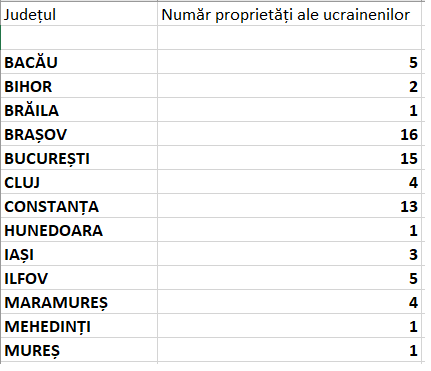
Romania is more of a transit country for refugees, as evidenced by the low number of people who have bought a home, according to data sent by the National Agency for Cadastre and Real Estate Advertising to HotNews.
About 100 registrations of property rights in favor of Ukrainian citizens have been officially registered, most of them in Brasov, followed by Bucharest and Constanta.
Five properties were bought in Bacău, one each in Mehedinca, Hunedoara and Mures, ANCPI data also show.

Since the beginning of the war in Ukraine, almost 3.5 million Ukrainians have entered Romania, of which approximately 100,000 have temporarily settled in our country, and the number of employment contracts of Ukrainian citizens concluded after February 24, 2022 is 5,787. The vast majority of people, who stayed in Romania are women with children of preschool age.
Almost 46,000 Ukrainians live in Romania, most of them in the districts of Maramures, Suceava and Timis.
At the national level, there are 7,141 employment contracts of Ukrainian citizens, of which 5,787 contracts have a start date of last year, according to data released on Monday by Labor Minister Marius Budai.
According to the 2022 census, almost 46,000 Ukrainians live in Romania, most of them in the Maramures region (over 25,000), Suceava (about 8,000) and Timișoara (over 4,000 Ukrainians).
The flow of Ukrainian refugees in Romania against the background of the Russian invasion, if it did not move the real estate purchase market, it disturbed the rental market.
“After the start of the war, at the first stage, Romania was a transit country. People came for 2-3 days, stopped at the embassy to get documents, many of them did not have passports for their children, and then went on,” explained Georgian Markou, a real estate broker, owner of the agency, in a conversation with him. HotNews.ro Green Angels and a member of the Professional Association of Real Estate Agents from Romania.
“At the second stage, Ukrainian refugees were looking for housing for 2-3 months, hoping that the war would end and they would return home. The problem was that the Romanian owners wanted to rent not for 2-3 months, but at least for a year. Rather, we found owners who would give us apartments for Ukrainians free of charge, covering the costs of communal services, rather than owners who would be ready to rent for a fee at the market price,” says Marku.
Realizing that the war would not end so quickly, refugees also began to rent long-term, especially in the upper price segment.
The old “50/20” program was rethought “into a medium- and long-term integration mechanism”
However, the Romanian support program for refugees from Ukraine has been changed and provides that Ukrainians who find work and enroll their children in schools in Romania will receive monthly from 2,000 lei per family until the end of the year, money that will be given directly to refugees, and not to the hosts who host them
What changes have been made:
- Refugees who take the minimum steps of integration – employment of refugees in the field of work, enrolling their children in a form of education and obtaining legal status in Romania – temporary protection – will be able to receive assistance in the amount of 2,000 lei per family to cover living expenses until the end of 2023.
- The accommodation money will go directly to the refugees, not to the homeowners who host them, as is the case now.
- In order to avoid misuse and misuse of funds, as happened in many situations, a single digital register of registration of refugees from Ukraine will be created.
- Vulnerable persons/elderly people over 65 and students studying at Romanian universities will continue to benefit from the old provisions of the 50/20 Programme.
- In the future, refugees from Ukraine will receive free medical services, as well as social and educational services.
The state spends more than 350,000 euros on refugees every day
An explanatory note justifying the changes cites a report by the Prime Minister’s Office on support measures for 2022, which shows that last year the state paid more than €106 million in public funds for the program, which amounts to a daily expenditure of more than 352,000 euro.
Source: Hot News
Lori Barajas is an accomplished journalist, known for her insightful and thought-provoking writing on economy. She currently works as a writer at 247 news reel. With a passion for understanding the economy, Lori’s writing delves deep into the financial issues that matter most, providing readers with a unique perspective on current events.